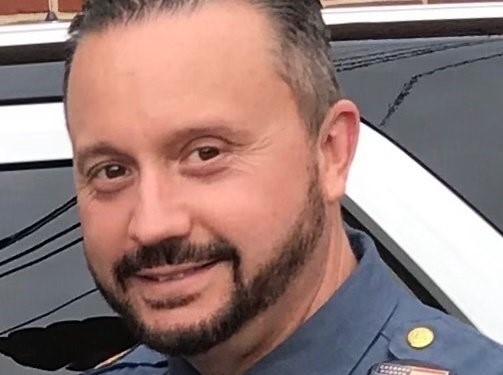Anthony Paparo remembered walking into his first roll call as a police officer in Upper Darby. Another officer saw the fresh-faced rookie and remarked that he looked like “Chachi” from the sitcom “Happy Days.”
The nickname stuck with Paparo, who retired with the rank of captain after serving 32 years as a law enforcement officer in Upper Darby. He went on to become police chief of Yeadon Borough in 2018, striving to foster harmony between police and residents in the predominantly Black borough of 11,500 in Delaware County.
Having seen happier days, Yeadon is now caught up in a controversy over Paparo’s future as police chief. It has become a flashpoint in a debate over race and social justice that has divided residents against a faction of Black council members who appeared poised to oust the longtime law-enforcement official, who is White.
At a special council meeting Thursday night, Paparo’s camp rushed to his defense. Several people gave impassioned remarks and held up signs that read, “Keep Chief Chachi.” An online petition garnered more than 1,000 signatures for Paparo, who residents said ushered in changes that made the borough safer and more secure.
Critics point to the chief’s alleged financial foibles at the helm of the 21-person department. An oversized check for $387,000 prominently displayed at the meeting, representing a fine opponents say he stuck borough taxpayers with through mismanagement. There was also a placard with a blownup excerpt from The Philadelphia Inquirer that said Paparo had been “repeatedly warned” taxpayers would be on the hook if he continued using too many part-time officers to supplement the force during the public health crisis and civil unrest of the last two years.
One speaker, an attorney, turned the alleged faulty evidence around and accused council members of using it as a propaganda tool to influence citizens without giving them “an opportunity to be heard.”
“Sir, you are not recognized,” Council President Sharon Council-Harris said.
“I am going to be recognized in court,” the man fired back.
In an interview with Delaware Valley Journal before the meeting, Paparo said he believed the allegations against him were a “smokescreen” for the council’s actual motive to get rid of him.
The chief said he began hearing rumors of his pending firing about a year ago, but dismissed them as borough scuttlebutt. Those rumblings, he said, came into sharp focus in January when Council-Harris and three colleagues were voted into office and took control of the borough council.
Soon after, Councilwoman Learin Johnson phoned one of Paparo’s Black subordinates to ask whether he was interested in taking over as chief. Paparo said he learned of the conversation from the detective who confided in him about the phone call.
Paparo’s supporters say the call is evidence that a desire to remove him is racially motivated, the Inquirer reported. It cited conversations with Yeadon Mayor Rohan Hepkins and Councilwoman Liana Roadcloud, who told the newspaper Johnson “specifically mentioned Paparo’s race” during conversations about ousting him.
Paparo said he was offered a three-month buyout to resign but declined, forcing a political showdown.
“I’m a cop. I don’t do politics,” he said. “I’m putting it in God’s hands.”
The Council-Harris faction was believed to have the votes needed to fire Paparo and seemed poised to do so Thursday.
After convening in executive session for more than 15 minutes to discuss the personnel move, council members, in a surprising twist, halted the vote. After consulting with the township solicitor and Paparo’s attorneys, who asked for the chief to be given a chance to defend himself against the allegations at a future hearing, the council agreed. The council moved to give Paparo a due process hearing.
“Chief Paparo needs to be afforded due process, and he will be,” Hepkins said.
The move followed a spirited debate about the chief’s character and qualifications to continue leading the borough police, with many speakers giving testimonials about his leadership and kind demeanor.
One longtime Black resident told council members Paparo was a genuine person who once came to his house and tossed around a football with his son.
“If ya’ll want perfect, you need Jesus up in here,” he said. “Is he a good person who does a little bad? I think this person here is a good person.”
Others cited Paparo’s efforts to improve racial relations in the borough. He hosts an online radio show to keep the community informed about what his officers are doing, and he started a “love garden” to bring residents together. As chief, he also screened a movie for officers and residents to learn about the pitfalls of racial profiling and how to guard against it.
“The color of a person’s skin shouldn’t be predicated on what they can do for a community. I think it’s important to diversify a department,” Paparo said. “I think one of the problems this world creates is problems for individuals of ethnic origins to want to be a cop based on everything that’s going on. [It’s hard] trying to good guys to apply when you’re talking about defunding the police, removing qualified immunity.”
Some speakers took the council members to task over perceptions they were targeting Paparo because of the color of his skin. Council-Harris fought back against those claims.
“I wasn’t born a bigot,” she said during the meeting.
Council-Harris, who did not respond to messages from DVJournal, told The Inquirer that her rationale for ousting the chief is because he cost the township a $387,000 fine as part of a Fraternal Order of Police grievance.
In 2019 and 2020, he hired part-time officers to supplement the force but “exceeded the number of hours” that were designated for extra help, violating a provision in the union’s collective bargaining agreement, the outlet reported.
Paparo defended his decision saying he needed to hire those part-time officers to ensure the borough was protected during the coronavirus pandemic and civil unrest.
“If it comes down to $387,000 to make sure my town is safe, it was money well spent,” he said.
Residents said there are better ways to correct the issues, like possibly putting Paparo on an improvement plan with outlined benchmarks and consequences if he doesn’t adhere to them. Others called on power-hungry politicians to resign saying they lacked “character and ability” to do their jobs impartially and were running the borough “like a dictatorship” by ousting Paparo.
For now, Paparo’s future remains in the air.
“I don’t see color. They don’t see color,” Paparo said of borough residents. “I see family. And they see family.”
Follow us on social media: Twitter: @DV_Journal or Facebook.com/DelawareValleyJournal

